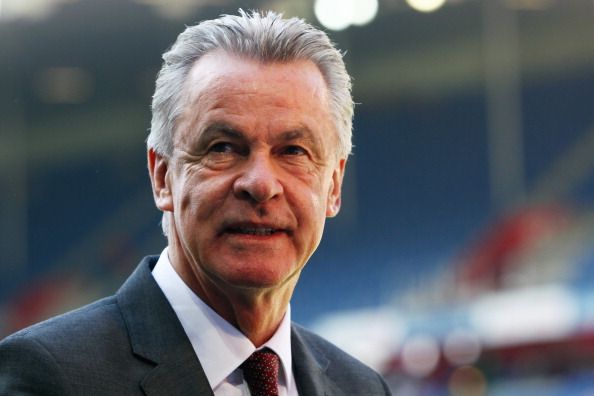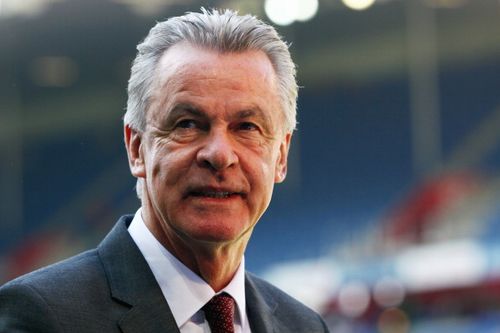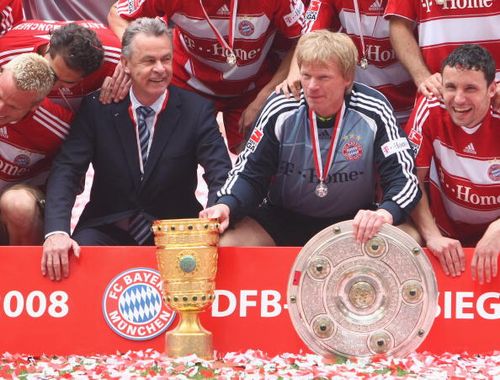
The 10 greatest club managers of our time - Ottmar Hitzfeld

“I hope that I know well the basics of math in football and try to apply them” said Ottmar Hitzfeld in 2007.
Having seen him win seven Bundesliga titles, two Champions League trophies and two Swiss leagues, it was hard to say that he hadn’t.
Winning two Swiss leagues as a player for Basel FC and having scored over 150 goals in his career, Hitzfeld shattered the myth that good players could not become great managers.
His playing career was as dramatic as his managerial. Hitzfeld was a youth-team player for TuS Stetten before joining the amateur ranks of FV Lörrach. He made the decision to retain his amateur status, thus enabling him to play for Germany FR with Uli Hoeness in the 1972 Olympic games in Munich.
He started five matches and scored in each of these games. In all, Hitzfeld played eight times for Germany FR’s national amateur team.
He joined FC Basel in 1971, and made an immediate impact for them, winning the Swiss League with the side in 1972 and 1973, finishing as the top scorer in Switzerland in the latter. He also won the Swiss Cup with Basel in 1975.
In 1975, Hitzfeld made the switch VfB Stuttgart, who had just been relegated from the German first division. In the 1976-77 season, he was part of the legendary “100-goal offense” (Stuttgart scored 100 goals and conceded only 36) and played a key role in helping Stuttgart return to the top flight. He scored 33 goals in the 55 games he played for them in the second division. He played 22 games for Stuttgart in 1977-78 and scored five times, helping them finish in fourth in the league. He played the remainder of his career for FC Lugano and FC Lucerne in Switzerland before retiring from football in 1983.
Hitzfeld joined FC Zug as a coach for the first time before joining FC Aarau, where he remained for four years. His Swiss Cup victory with Aarau caught the eye of many, and he was offered the manager’s role with Swiss giants Grasshopper.
He didn’t disappoint for them, as he won four trophies with the side, beginning with the Swiss Cup, then a domestic double, and then another Swiss league title during his tenure from 1988 to 1991.
In 1991 he took up the job at struggling Borussia Dortmund, who were languishing in 10th in the Bungesliga table.He led them to second place in this first season, following it up with a UEFA Cup final appearance, only to lose to Juventus in both legs.
He won his first trophy in Germany in 1995, leading Dortmund to the Bundesliga title, which in fact was their first piece of silverware since 1988-89.
He repeated the feat the following year, and then followed it up by winning the UEFA Champions League, destroying old nemesis Juventus in the final. He won the “World Coach of the Year” that season for his achievements.
He can be credited for laying the foundations on which the current Dortmund team is currently enjoying its successes.
He moved to FC Bayern Munich on 1 July 1998, and claimed a whole host of titles (league champions in 1999, 2000, 2001, 2003, and 2008; Cup winners in 2000, 2003, and 2008; Champions League winners in 2001; Intercontinental Cup winners in 2001).

He saw his team suffer a heartbreaking loss to Manchester United in the finals of the 1998-99 UEFA Champions League final after conceding twice in extra time, having been 1-0 up for most of the game.
Stat: Together with Ernst Happel and Jose Mourinho, Hitzfeld is only other coach to have won the Champions League (or European Champion Clubs’ Cup) with two different teams.
He won the “World Coach of the Year” award again in 2001.
In 2001-02, after it emerged that Sir Alex Ferguson wanted to retire, Hitzfeld, alongwith Sven-Goran Eriksson and Lous Van Gaal, were listed as the top candidates to replace him.
Hitzfeld however opted to drop out of the race because of his inability to speak fluent English. It is however common knowledge how Ferguson changed his mind about retirement in February 2002.
Failing to lead Bayern Munich to any trophies in 2004, he took a break from the game for a few years, but then came back after the sacking of Felix Magath only to lead the side to fourth in the league, thereby failing to qualify for the Champions League for the first time in more than ten years.
After heavy spending at the club, he won Bayern Munich three domestic trophies and a place in the semi final of the UEFA Cup in 2007-08, before finally leaving the German giants in the hands of Jürgen Klinsmann.
2008 saw Hitzfeld take up another challenge, as he took over as coach of the Swiss national team and helped them qualify for the 2010 FIFA World Cup. Switzerland went onto beat eventual champions Spain, but failing to get victories against Chile and Honduras, went out of the competition.
Hitzfeld is known for his ability to make his teams work well together. He has been instrumental in developing and applying new techniques, tactics and strategies when he has seen the necessity. The coach has been brought up on perfectionism, and he sticks to all the details that he believes would lead his teams to success.
For example, as a coach of the Switzerland national team he made the players train in a specially-selected mountain resort, where the height above sea level helped players adapt to the conditions they would face in South Africa.
The one line which can sum up his coaching philosophy is: “The next match is the most important match, and we must do everything to win.”
Hitzfeld sends his side onto the field with the calculations one can expect of a mathematics teacher. His success over the years all owe to his thorough preparation and player briefings.
Hitzfeld has always taken pride in keeping a tight leash, with discipline being of the utmost importance. Apart from his his man-management skills, Hitzfeld is also a canny tactician, capable of changing the shape and intent of his team if an encounter isn’t going his side’s way.
It is therefore fitting that the most successful German coach in club football was included in our list of the The 10 greatest club managers of our time.
Who else made it to the list? Find out here: Top 10 managers